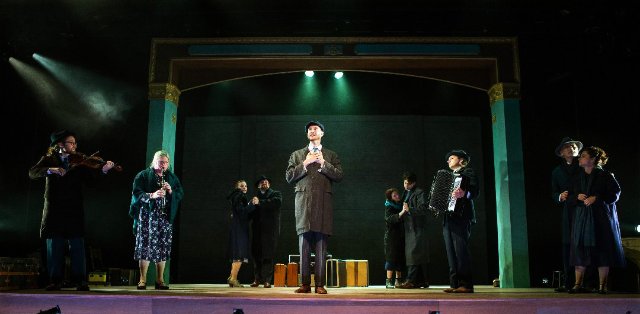Indecent by Paula Vogel
San Francisco Playhouse and Co-produced with Yiddish Theatre Ensemble,
By: Victor Cordell - Oct 01, 2022
The bare, blackened, back stage and proscenium arch represent the tabula rasa upon which theater brings joy and sorrow. But what of its only props - several suitcases? Do they signify the travel of the play and its artists from place to place? Do they signal a search for a safe haven? Or do they hold the meager possessions that its owners would be allowed to carry with them to concentration camps and probable extermination?
Decorated playwright and professor Paula Vogel wrote several successful plays and mentored fellow Pulitzer Prize winners Lynn Nottage, Nilo Cruz, and Quiara Alegria Hudes as well as Sarah Ruhl and others. But only in 2017 did her own work finally reach Broadway with “Indecent,” which would become a Tony Award winner. San Francisco Playhouse and Yiddish Theatre Ensemble offer an immensely powerful production of this equally powerful play, a metatheatrical treatise of the highest order. It makes for thoughtful and compelling drama that should not be missed.
The genesis of “Indecent” begins in Warsaw in 1906. Young author Sholem Asch has written a Yiddish play called “God of Vengeance,” which acts as a play-within-a-play in “Indecent,” as scenes from the former appear throughout the latter. Portrayed passionately and with grand gestures by Billy Cohen, Asch entreats other writers to participate in a table reading. After the reading, I. L. Peretz, Warsaw’s most distinguished Yiddish author, tells Asch to burn the play. Despite contentiousness and only a modicum of support, a Yiddish language company produces the play.
Over the next several years, “God of Vengeance” would be translated into various languages and travel to the major theater centers of Europe. The contemporary play depicts highlights of issues faced by the earlier one as it spread to foreign locales. Early on, it was presented in Yiddish in lower Manhattan, but it wasn’t until 1923 that a production of an English translation appeared “uptown.”
Vogel takes us on a riveting journey through that historical evolution of “God of Vengeance” from launch to acclaim to disrepute and beyond. Through “Indecent,” we learn of the essence of “God of Vengeance” - of the artists involved and of the times; of its connection through the Holocaust; and to Asch’s being called before the U.S. House Un-American Activities Committee.
Although many in turn-of-the-century Europe, particularly Jews, considered the earlier play blasphemous, only when its forbidden love was seen by gentiles in the United States was it broadly deemed as indecent. Legal actions were triggered, albeit, initiated by an assimilated rabbi. Because it was withdrawn by the playwright around World War II, it hibernated for decades and was nearly forgotten before the welcomed revival of this culturally significant work.
Asch’s play was incredibly daring for its time, especially given its originally intended audience. First, an observant Jew runs a brothel in the basement of his home. Then, his daughter falls in love with one of his prostitutes, which results in lesbian action and narrative. Along the way, a Torah scroll is desecrated. Many Jews found these plotlines not only scandalous and sacrilegious but anti-Semitic.
“Indecent,” Vogel’s love letter to Jewish culture and to theater possesses many moving parts, and Director Susi Damilano mixes them with great skill and nary a false move. Without a distinguishing set, other artistic elements establish the vitally important tone of the play. Perhaps the period music most imbues the feel of narrative. A klezmer trio often shares the stage with actors, playing the mostly sad and occasionally fast paced music of Eastern European Jewish stetls. The instruments are sometimes accompanied by voice and often by the Nicole Helfer choreographed folk dances of the place and time. Costumery gives an authentic look to the cast, and Wen-Ling Liao’s high contrast lighting adds drama.
An exemplary cast of seven fine actors deliver the goods. Each plays multiple roles in the play and the play-within-a-play, often requiring different accents and languages. Apart from Cohen, Dean Linnard stands out in his main role as Lemml, who provides comic relief as he mangles various languages. A nebbish who was an early supporter of Asch, he finds his footing as the stage manager of the traveling “God of Vengeance.” Ultimately, he becomes demonstrative and demanding and challenges Asch’s integrity with great determination when the play is watered down to accommodate the marketplace without the playwright’s protest. The theme of censorship, and how it reflects political and social weakness rather than strength, especially resonates in today’s increasingly intolerant and divisive environment.
“Indecent” is comprised of many vignettes that build the drama. Some evidence pathos, especially those of the Holocaust and Asch’s emotional withdrawal after witnessing pogroms in Lithuania. At least one offers joy and release, the rain scene between the brothel owner’s daughter Rivkele and the prostitute Manke from “God of Vengeance.” It may be considered in content and significance as a lesbian corollary to the balcony scene in “Romeo and Juliet.” It reminds us that love of every kind brings goodness to the world.
“Indecent,” written by Paula Vogel, is produced by San Francisco Playhouse and co-produced with Yiddish Theatre Ensemble, and plays at SF Playhouse’s stage, 450 Post Street, San Francisco, CA through November 5, 2022.

